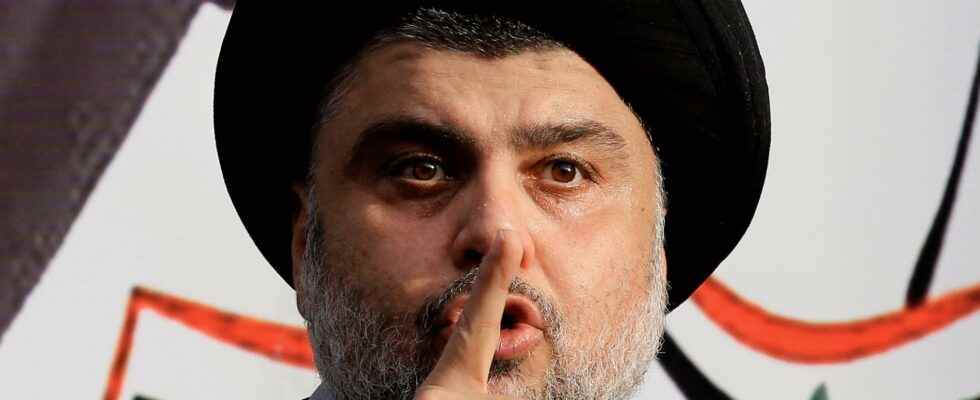Published: Just now
full screen
Next
Shia leader Muqtada al-Sadr. Archive image.
1 of 2 Photo: Karim Kadim/AP/TT
He can get his followers to storm Parliament, and just as quickly disperse them again.
The Shia preacher Muqtada al-Sadr is one of the most powerful men in Iraq, where the political contradictions risk leading to civil war between Shia Muslims.
The fighting that erupted in Baghdad’s Green Zone this week was among the deadliest the capital has seen in years.
The violence erupted after Muqtada al-Sadr said he would leave politics, prompting his supporters to clash with security forces and rival militia groups.
The escalation prompted al-Sadr, in a televised speech, to demand that his supporters, who he had previously called on to storm parliament, withdraw within 60 minutes. The area began to empty as soon as the speech ended.
– A formidable demonstration of power, to be able to show that he can snap his fingers and people disappear within an hour, says Bitte Hammargren, Iraq expert at the Foreign Policy Institute (UI).
A fragile calm emerged, but the risk of more violence is imminent.
War between Shiites
The latest political crisis in Iraq – which emerged last October when al-Sadr’s coalition won parliamentary elections but lacked a sufficient majority to form a government – has created a highly volatile situation in Iraq with a power struggle between two Shiite blocs: one supporting the nationalist al -Sadr, and one that is loyal to Iran.
The risk of a civil war where Shia Muslims fight against other Shia Muslims cannot be ruled out, according to Hammargren.
– But there could also be new elections or a broad and more Iran-friendly Shia coalition, which Muqtada opposed.
Influential family
Muqtada al-Sadr’s power lies largely in his name. His family is held in high esteem among devout Shia Muslims. His father, Muhammad al-Sadr, was the Grand Ayatollah who was assassinated in an assassination attempt in 1999, believed by many to have been ordered by then-dictator Saddam Hussein.
Most of the powerful Shia families left Iraq during the Saddam Hussein years. But the Sadr family stayed in the country. Muhammad al-Sadr introduced aid programs for poor Shia Muslims in southern Iraq. Many of them live today in Sadr City, a large district of Baghdad named after the family and where Muqtada al-Sadr’s followers are based today.
When the US invaded Iraq in 2003, Muqtada al-Sadr organized the so-called Mahdimilis, which fought against the occupiers.
All this promotes the image of Muqtada al-Sadr as an Iraqi nationalist with great influence among especially poor Shia Muslims.
According to the Chatham House think tank, both the US and Iran have tried to bring al-Sadr over to their respective camps.
Greatest risk in the south
If the spark for a civil war were to be ignited, it would probably happen in southern Iraq, according to Bitte Hammargren. There is lawlessness, conflicts between tribes and there are a lot of weapons. And both Muqtada’s current militia, the Peace Brigades, and Loyalist Iran militias are active there.
– People are so terribly tired of conflicts. But the blood can boil in individual places, which can start a process that cannot be controlled, she says.
Facts
The conflict in Iraq
In 2003, the US-backed invasion of Iraq began and the dictator Saddam Hussein was overthrown. The US’s vision of spreading democracy in the country did not work, on the contrary, the invasion contributed to the disintegration of Iraq. Suicide bombings and terrorist acts hit innocent civilians who belonged to the “wrong” ethnic group or religious orientation. The violence peaked with growing fears of a full-scale civil war between Shiite Arabs, Sunni Arabs and Kurds. After the US withdrawal in 2011, the conflict between the three main groups has remained unresolved.
In January 2014, the Islamic State (IS) seized parts of Iraq and proclaimed a “caliphate”. IS’s violence so terrified the outside world that the United States once again intervened militarily in Iraq, with the support of other countries.
The division in Iraqi politics persists, and is characterized by contradictions between forces that the US supports and groups that have close cooperation with Iran. The Shia groups also do not draw evenly among themselves. One attempt after another to bring about a functioning government fails.
Iraq has around 40 million inhabitants. Just over 60 percent are Shia Muslims.
Source: Landguiden/UI
Read more
